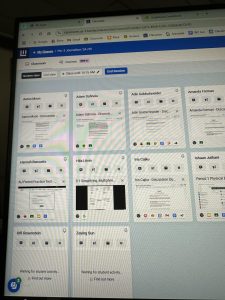In our generation, an age of digital tools, educational technology promises to ensure academic integrity and student engagement. At Tenafly, specifically, this promise comes in the form of Classwize, a cloud-based classroom management tool that allows teachers to see live screenshots of students’ device activity. It claims to “protect students from seeing inappropriate or harmful content while giving teachers the tools to minimize distractions and provide rich and immersive digital learning experiences.” However, there are still many who are wary of Classwize’s ethics, and the burning question persists: Does Classwize cross the line between ensuring academic integrity and infringing on student privacy? Opinions are divided.
For those who don’t know what Classwize is, it is a classroom management tool that is downloaded onto student devices so that teachers can use it to watch what each student is doing on his or her school-issued Chromebook during class time. “Real-time visibility and intuitive controls allow teachers to protect students from online distractions and harmful content while keeping them focused, engaged and learning,” Linewize Classwize, advertises on its web site.

At Tenafly, a number of teachers have expressed strong support for the use of Classwize. Teachers see the application as an important tool while teaching because students could end up being easily distracted during class. While a teacher is running Classwize, students may make more effort to work harder on assignments and pay better attention to lessons. This application can also be helpful to teachers because they can monitor their students’ computers while they take online tests to ensure there is no cheating.
Mrs. Barker, a history teacher at THS, is a proponent of the application. “Students are more focused during the research time I provide, because of the rules that I have preloaded and the ability to redirect a student who is getting distracted,” she said. This ability to maintain focus during class has led to higher-quality work and better classroom productivity, Barker said.
Although many teachers cite the benefits Classwize offers, many students have negative perspectives due to the fact that many see it as an invasion of privacy. Students see Classwize as a negative tool for a number of reasons. For instance, teachers have the ability to close out certain tabs without valid cause, even if the student has completed his or her assignment. Although some students feel that Classwize is helpful for making sure there is no cheating on quizzes or assignments, they feel that the hindrances outweigh the benefits. Once students are done with their work, they may have spare time and want to finish other assignments that are school-related. But Classwize limits that, as teachers are able to close out students’ tabs when they see they are not working for that certain class without the teacher realizing those students have already finished their work for that class.
“[In my opinion], Classwize is an invasion of my privacy because when I finish doing my work in class and start doing other work for a different class, my teacher closes my tabs, not knowing that I was done with my work,” said Gil Raz (’27). “I wanted to be productive and use the time to finish my other work, and I felt that it was unnecessary for a teacher to completely dismiss my tabs without any context.”
Moreover, Classwize allows teachers to monitor students’ screens until 4:30 in the afternoon, extending beyond school hours. While this enables students to make up work or assessments past 3:11, it also means that teachers can access students’ screens during non-school-related activities. This issue is amplified when teachers monitoring outside their scheduled class time can view the screens of all students in the class, raising privacy concerns.
Mr. Whitehead, an English and Journalism teacher, has experienced this first-hand. “When I look at students’ open tabs in Classwize, I can see the web sites they’re visiting, and some of these tabs may be open web sites that the students would rather I don’t see,” he said.
Barker added that using Classwize requires monitoring an entire class even if a teacher only wants to check on one student’s activity at a given moment. “I can run a report that can look at all activities within a time period, and it will show me things that happen outside of class if I choose to look at a longer period of time for that single student,” she said. Barker even found the amount of information available to her “overwhelming,” saying it “gave [her] too much information to go through.”
Classwize also gives teachers the ability to block certain websites on student computers, which could not only lead to a limited access to resources but also to students being blocked from using websites even if they aren’t in class.
“One example of a problem created by my use of Classwize occurred last year, when I locked down student browsers during a Socrative quiz,” Whitehead said. “One student was out of class for a Teen PEP presentation, and she emailed me frantically because she was unable to open the Google Slide presentation she was about to use with the middle schoolers.”
However, some teachers believe that a certain amount of invasion of privacy simply balances academic integrity and safety. “Entering a public school means giving up some degree of privacy,” Mr. Oppedisano, another English teacher at the school, said. “If Classwize invades a degree of student privacy in order to foster an environment where authentic learning can occur, then I personally would consider this a worthy trade.”
As Classwize can be an advantage to some teachers and a disadvantage to some students, it raises discourse between both sides. Some students feel that the idea of teachers being allowed to view their screens at any time of the day is an invasion of privacy. For teachers, some like it because it benefits their teaching method, and others are skeptical, as they understand how it can breach student privacy. With technologies like Classwize beginning to inundate schools across the nation, students and teachers alike may want to give more thought to the tools that impact their daily lives. Is it unethical for teachers to have access to students’ screens, even when there is not an online quiz? Or is it smart for teachers to have access so that they can ensure that their students are on track? The answer appears to depend on whom you ask.

















